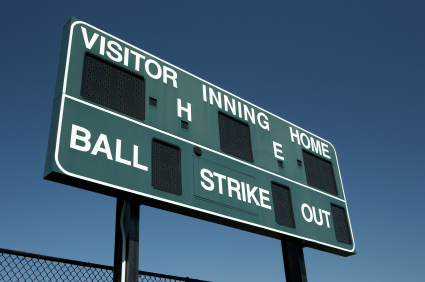When going to a job interview, it’s important to have a strong understanding of the types of qualifications that your potential employer is looking for. The college baseball recruiting process is no different. As a recruit, you should have a firm grasp on the things college coaches are looking for. There is a long list of things that coaches evaluate in prospects, both on and off the field. You can read about what college recruiters are evaluating in our popular series that follows Alex, a recruit just like you. In this article, however, we want to focus on one of the things coaches are not paying much attention to—your high school stats.
Sure, college coaches look at stats to verify their evaluation or to get a base level of understanding, but recruits (and parents) often make the mistake of emphasizing stats in two major ways. First, they use high school stats as part of their sales pitch in attempts to garner interest from college coaches. Second, they use stats as a way of comparing themselves to teammates or peers. While stats may seem like an easy and logical way to get attention or compare two players, both uses are flawed and should be avoided. Keep reading for 5 reasons why stats as part of a sales pitch and stats for comparison don’t work in the college baseball recruiting process:
5 Reasons Stats Shouldn’t Be Your Recruiting Sales Pitch:
- Your stats depend heavily on your competition and your competition is nowhere near as qualified as it will be at any college level. Batted balls that are hits in high school may turn into outs in college. Likewise on the mound, pitches that are swing-and-misses in high school can become hard hit balls in college.
- Your stats do not necessarily translate to the college level. Hitting .400 against pitchers who throw 75-82 is much different from hitting .400 against guys who throw 85+. Good college coaches can assess whether your skills will play out at their level.
- Your stats don’t tell college coaches anything about your raw tools, which is what they truly care about and are recruiting.
- Your stats don’t tell coaches anything about your projectability (how coaches see or “project” your raw tools, athleticism, physicality, and baseball IQ to develop as you mature in college).
- Your stats don’t tell coaches about your maturity, how-to-win awareness, baseball savvy, or character, all of which are a major part of the recruit evaluation.
5 Reasons Stats Are a Poor Method for Player Comparisons:
- College coaches don’t care about how you are doing relative to your competition now, they care how that will play out at their respective college level. Your stats may mirror that of a teammate, but you are each in distinct places in your development. One of you may have reached your peak in a coach’s eyes, while the other is just starting to discover potential.
- Not all equal stats are equal in the eyes of college coaches. If Player A has 10 hits in 30 ABs, but all the hits come against pitchers that will not play college baseball, that is much different from Teammate B who has 10 hits in 30 ABs, all coming against future D1 arms. Similarly, if Player A is playing in the most competitive high school conference in Florida and Player B is playing in Montana, those are two very different stat lines to compare.
- College coaches are looking for specific needs. Stats likely have little to do with finding this unique fit. Your high home run total might not fit the need for a speedy leadoff man.
- All college coaches have different preferences and things that they like. Lucky for you there are college coaches out there that covet your skill set. There are others that may not. Don’t take it as a personal attack if a peer with a similar stat line as you catches a coach’s eye and you do not. They may just be looking for a different skill set.
- Every college recruiting process is unique and has different circumstances. As much as possible, you should avoid comparing your recruiting process to that of your peers. It’s not a race, it’s about finding your fit. Making decisions based off of what your peers are doing is one of the worst possible things you can do. Plan, don’t panic.
As you can see, relying heavily on high school stats is a flawed way of attracting attention from a college coach and just as bad of a way to compare yourself to your peers. In addition to being hard to verify and easy to make up, your competition pool is small and recruiting is happening on a national stage. Share your stats with coaches, but understand that they are a very small piece of the puzzle. If you want to get attention from college coaches, develop a strong recruiting plan, recruit schools as hard as you wish to be recruited, play hard and follow Alex’s lead.







